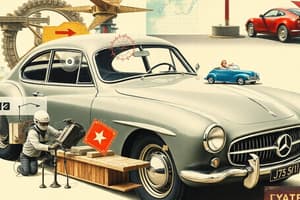Podcast
Questions and Answers
Who is credited with inventing the first gasoline-powered car?
Who is credited with inventing the first gasoline-powered car?
- Karl Benz (correct)
- Gottlieb Daimler
- Henry Ford
- Morrison Electric
What is the primary function of the transmission?
What is the primary function of the transmission?
- Directs exhaust gases away from the vehicle
- Transmits power from engine to wheels (correct)
- Converts fuel into energy
- Absorbs shocks and maintains vehicle stability
What type of car has a rear door that swings upwards?
What type of car has a rear door that swings upwards?
- Truck
- Sedan
- SUV
- Hatchback (correct)
What is the primary function of the brakes?
What is the primary function of the brakes?
What type of car is powered by an electric motor and battery?
What type of car is powered by an electric motor and battery?
What feature alerts the driver of unintended lane departure?
What feature alerts the driver of unintended lane departure?
What is the benefit of regular oil changes?
What is the benefit of regular oil changes?
What type of vehicle has an open cargo bed and separate cabin?
What type of vehicle has an open cargo bed and separate cabin?
What is the primary function of the exhaust system?
What is the primary function of the exhaust system?
Flashcards are hidden until you start studying
Study Notes
History of Cars
- First gasoline-powered car invented by Karl Benz in 1886
- First electric car invented by Morrison Electric in 1899
- Early 20th century: cars become more affordable and gain popularity
- 1908: Ford Model T introduced, revolutionizing mass production
Types of Cars
- Sedan: 2- or 4-door car with fixed roof
- Hatchback: car with rear door that swings upwards
- SUV (Sport Utility Vehicle): high-ground-clearance vehicle with spacious interior
- Truck: vehicle with open cargo bed and separate cabin
- Electric Vehicle (EV): powered by electric motor and battery
- Hybrid: combines internal combustion engine with electric motor
Car Parts and Functions
- Engine: converts fuel into energy
- Transmission: transmits power from engine to wheels
- Brakes: slow or stop the car
- Suspension: absorbs shocks and maintains vehicle stability
- Exhaust system: directs exhaust gases away from the vehicle
Safety Features
- Airbags: inflatable cushions that deploy in crash
- Anti-lock Braking System (ABS): prevents wheels from locking up during hard braking
- Electronic Stability Control (ESC): stabilizes vehicle in skidding situations
- Lane Departure Warning (LDW): alerts driver of unintended lane departure
Car Maintenance
- Regular oil changes: extends engine life
- Tire pressure checks: improves fuel efficiency and safety
- Brake pad replacements: maintains braking performance
- Scheduled servicing: prevents mechanical issues
History of Cars
- Karl Benz invents the first gasoline-powered car in 1886
- Morrison Electric invents the first electric car in 1899
- Cars become more affordable and gain popularity in the early 20th century
- The Ford Model T is introduced in 1908, revolutionizing mass production
Types of Cars
- Sedans have 2 or 4 doors and a fixed roof
- Hatchbacks have a rear door that swings upwards
- SUVs (Sport Utility Vehicles) have high ground clearance and a spacious interior
- Trucks have an open cargo bed and a separate cabin
- Electric Vehicles (EVs) are powered by an electric motor and battery
- Hybrid vehicles combine an internal combustion engine with an electric motor
Car Parts and Functions
- The engine converts fuel into energy
- The transmission transmits power from the engine to the wheels
- The brakes slow or stop the car
- The suspension absorbs shocks and maintains vehicle stability
- The exhaust system directs exhaust gases away from the vehicle
Safety Features
- Airbags are inflatable cushions that deploy in a crash
- Anti-lock Braking System (ABS) prevents wheels from locking up during hard braking
- Electronic Stability Control (ESC) stabilizes the vehicle in skidding situations
- Lane Departure Warning (LDW) alerts the driver of unintended lane departure
Car Maintenance
- Regular oil changes extend the engine's life
- Checking tire pressure improves fuel efficiency and safety
- Replacing brake pads maintains braking performance
- Scheduled servicing prevents mechanical issues
Studying That Suits You
Use AI to generate personalized quizzes and flashcards to suit your learning preferences.



